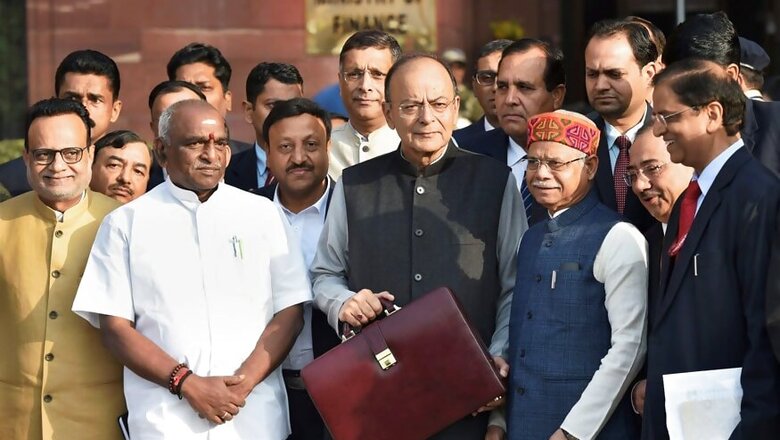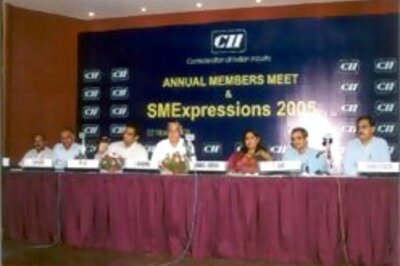
views
New Delhi: Nearly 30 minutes of Finance Minister Arun Jaitley’s Union Budget speech of 2018 were devoted to the farm sector. In the course of his speech, he uttered the word ‘farmer’ 27 times while ‘agriculture’ was said 29 times. The country’s poor got 21 mentions but the salaried-class – those who diligently pay taxes – were mentioned just seven times.
Not taking away anything from either farmers or the poor, the above statistic merely shows that the salaried middle class — the backbone of the economy — gets a royal ignore from most policy makers.
Why the middle class salaried Indian is crucial to the government’s revenues is amply clear from what the finance minister himself said in his speech.
For assessment year 2016-17, the average tax paid by a salaried individual was almost three times that paid by an average businessperson.
Here are some numbers: For assessment year 2016-17, 1.89 crore salaried individuals filed returns, paying total tax of Rs 1.44 lakh crore or average tax of Rs 76,306 per individual. Of the 1.88 crore individual business taxpayers, including professionals, total tax was just Rs 48,000 crore or Rs 25,753 per individual. The salaried class, along with pensioners, comprise 25-30% of total tax base, the finance minister said in his post-Budget interaction with the media.
Shouldn’t then the finance minister have heeded the often repeated call of reducing the tax burden on the salaried?
For small and medium businesses, Jaitley has offered several relief measures, besides widening the scope for companies, which will now pay corporation tax at a lower rate. Despite widespread speculation that this time perhaps, the salaried will get some relief in income tax slabs, the FM announced there was no change in these slabs.
Instead, he offered two measures that can be summed up as net-negative. First, the Rs 15,000 medical reimbursement and Rs 19,200 transport reimbursement has been done away with and replaced with a standard deduction of Rs 40,000. Second, cess on income tax paid has now gone up to 4% from 3% earlier.
This goes to show that the middle class gets no relief in taxation in terms of slabs and it has to make do with a standard deduction which experts say, will translate into only Rs 5800 less from net taxable salary in a year. On top of this meager amount offered as a sop, the FM has imposed a 100 basis points additional cess which is likely to increase the total income tax out-go.
Archit Gupta, Founder & CEO of ClearTax said that the standard deduction has been reintroduced but at a cost, since it takes away medical reimbursement and travel allowance. “There were several demands to raise medical reimbursement from 15,000 and bring it up according to current prices (the amount has been same since more than a decade). However, now the clamour for raising this limit will die down. With this, for a salaried person, the amount taxable under salary shall be reduced by Rs 5,800. While cess will go up by 1%.”
The only good news on the personal tax front is that senior citizens who face much lower burden of taxes. The exemption of interest income on deposits with banks and post offices for seniors has been increased from Rs 10,000 to Rs 50,000 and tax deductible at source will no longer be required on such income. This benefit shall be available also for interest from all fixed deposits schemes and recurring deposit schemes.
The limit of deduction for health insurance premium and/or medical expenditure has been raised from Rs 30,000 to Rs 50,000. Additionally, all senior citizens will now be able to claim benefit of deduction up to Rs 50,000 per annum in respect of any health insurance premium and/or any general medical expenditure incurred.
Jaitley said that he has been offering several relief options to the middle class through previous budgets. Also, with the dreaded long term capital gains tax (LTCG) being re-introduced, he ensured that the salaried cannot complain of step-motherly treatment as any and every form of income of everyone would now be taxed.
Why the FM was apathetic to the salaried middle class this time could well be partly due to fiscal compulsions, political exigencies and the fact that a large Pay Commission payout has already been made to government employees.
That just leaves the salaried who work in the private sector at the receiving end.
(The author is senior journalist)



















Comments
0 comment